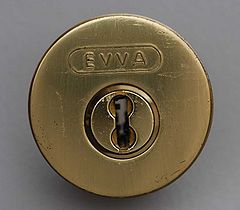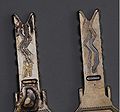EVVA 3KS: Difference between revisions
(Added patent reference) |
mNo edit summary |
||
| Line 8: | Line 8: | ||
| lock_design = [[Sidebar]], [[Slider]] | | lock_design = [[Sidebar]], [[Slider]] | ||
| maker = [[EVVA]] | | maker = [[EVVA]] | ||
| patent = [http://www.google.com/patents?id=S98kAAAAEBAJ | | patent = [http://www.google.com/patents?id=S98kAAAAEBAJ US 4,977,767] | ||
}} | }} | ||
Revision as of 18:05, 7 January 2010
EVVA 3KS
| EVVA 3KS | |
 | |
| Name | EVVA 3KS |
|---|---|
| Manufacturer | EVVA |
| Lock Type | Varied |
| Lock Design | Sidebar, Slider |
| Year(s) Produced | 1993-Present |
| Patent | US 4,977,767 |
The 3KS (3 Curven System) (3 Curve System) is a high security sidebar-based lock made by EVVA. The 3KS is resistant to most methods of entry, and is immune to key bumping attacks. It uses two sidebars that interface with six sliders each, as well as a passive key profiling mechanism.
Principles of Operation
The 3KS uses a total of twelve free-floating sliders, two sidebars, and a passive profile bar. Sliders are divided into two groups of six, each located on one side of the keyway. Each set of sliders has its own sidebar. The key uses two sets of laser tracks to manipulate single and double pin sliders. The top and bottom of the blade have cuts corresponding the passive key profile bar used in the lock.
When the key is inserted the sliders are guided by the laser tracks of the key. Once fully inserted the profile bar falls onto the top of the key. If the profile and slider cuts are correct the plug can rotate. When the plug is rotated the sidebars are pushed into the key to hold it in place.
Notes:
- There are 96×76 total differs.[1]
- Double pin sliders have 7 positions, and single pin sliders have 9 positions.
- Key blanks come with the double pin laser track pre-cut; locksmiths only need to add the single pin cut.
- Sliders and sidebars are made of hardened steel and are teflon coated for additional longevity.
Key Control
3KS keys are patent protected and duplication is restricted. 3KSPlus keys are patent protected until 2025. The laser tracks and other key features make manual duplication difficult. A key security card is required in order to obtain duplicate 3KS keys.[2]
Disassembly instructions
The 3KS requires the key be removed from the cylinder for the plug to be withdrawn. Sliders must me properly centered or they will block removal of the plug, similar to how they block removal of the plug when a key is inserted.
It is much easier to disassemble the 3KS if the cylinder can be removed from its mounting and held so that the keyway is parallel to the ground. This is because sliders need to be positioned in the center of the plug, but also because it prevents the sliders from falling out when the plug is withdrawn.
- Remove the cam and C clip.
- Hold the cylinder so that the keyway and sliders are parallel to the ground.
- Insert and remove a key. (This centers all sliders)
- Lightly push the back of the plug. If all sliders are centered it should easily withdraw from the cylinder.
Vulnerabilities
The 3KS may be vulnerable to one or more of the following:
- Lockpicking (3/5)?
Notes:
- Immune to key bumping attacks. Bumping causes damage to both the key and sliders.
- The top or bottom of a key may be filed off to defeat the key profiling mechanism.
Gallery
The 3KS plug with all components removed.
3KS key security card.
Inner view of the cylinder.










